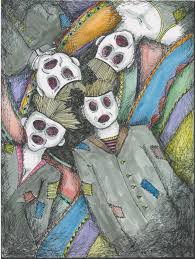Cartesian Dualism is a system of thought where the mind and body are separate entities only interacting with one another by way of language. In this paper the concept of Cartesian Dualism will be applied and analyzed in “The Hollow Men” By T.S Eliot.

Here is the first example “We whisper together/Are quiet and meaningless” (8-9). The Hollow Men can not say anything of significance.
The problem they are experiencing is the disconnect between the mind and the body, a struggle often seen in Cartesian Dualism since thoughts are separate from actions, and language is imperfect at merging the two sides seamlessly.
The narrator is describing what the Hollow Men have and what they lack– “Shape without form, shade without colour/ Paralyzed force, gesture without motion” (11-12). They are missing something essential to be complete. The pairs of words are contradictory of one another and ironic because one is not possible without the other.
This symbolizes how the mind and body are separate but very much so dependent on one another. If the mind is not working, the body will cease to function properly. If the body is not well, the soul will struggle because physical stress causes emotional turmoil.
In section II the souls of the departed pass by the Hollow Men, but they try not to look at those who are heading to “death’s other Kingdom”, for the Hollow Men are timid and fearful.
They are fearful they will be seen for what they are by passing souls. So as not to have their secret discovered, they wear “Such deliberate disguises/ Rat’s coat, crowskin, crossed staves/ In a field” (34-36). The Hollow Men are putting on a physical mask to hide their true selves. Humans do this too, but it is mainly in a metaphorical sense.
People often conceal themselves with imaginary masks to hide insecurities and to allow others to see only what they intentionally let them see. This metaphorical mask is synonymous with both the mind and the body. It is possible to deceive others through appearance or personality. In these lines, the author implies that the Hollow Men are secretive about their condition of incompleteness in that they have straw in their heads but are otherwise hollow.
In section III The Hollow Men dwell in an environment where only cacti survive. Nothing else living exists; they are not alive. They have only half of what they need to be living, stuck in a perpetual hell-like state where they are unable to communicate effectively. A challenge faced with Cartesian Dualism is that language is unreliable.
There are contradictions and mistakes. Language is how the barrier between the internal self (mind) and external self (body) interact. It is the cross-over that brings the two independent structures together. The only way to allow others to understand us is through speech or another equivalent form of communication. The Hollow Men can only produce fragmented sentences and ideas. They are on this seemingly tireless quest for meaning.
In Section IV, The Hollow Men are at the bank of an overflowing river. Their time is coming to an end. Soon they will meet their fate when God judges them, or heavenly souls restore their knowledge and truth.
In Section V, the Hollow Men come together and begin chanting the tune to around the “ Mulberry bush” except there are no mulberry bushes so they instead change the lyrics to go like this “Here we go round the prickly pear/ Prickly pear prickly pear/ Here we go round the prickly pear/ At five o’clock in the morning” (68-71).
Typically, nursery rhymes are cheerful, but not in this situation. The Hollow Men are singing this in their final moments. As they chant, the Hollow Men move in circles around the prickly pear. This is representative of the monotony and unimportance their existence seems to serve.
There is a shadow that hangs over the Hollow Men and prevents them from being complete. This shadow acts as a wall or barrier. The last quote is “Between the desire/ and the spasm” (84-85). These lines are sexual in nature but show that the shadow is suppressing their quest for pleasure.
The shadow is acting much like the Ego– one of the three metaphysical forces that mediate between our primal desires and conscience. The last lines Eliot says are, “This is the way the world ends/ Not with a bang but with a whimper” (97-98). The Hollow Men’s existence was one of quiet desperation. For them, the world does not end in a violent fiery explosion, but a soft whimper. It is an anticlimactic ending.
T.S Eliot’s poem “The Hollow Men” provides many examples of the founding principles of Cartesian Dualism. His poem is timeless and one of the most influential works of the 20th century.
Works Cited
Eliot, T.S. The Hollow Men.
Mcleod, Saul. “Id, Ego and Superego.” Id Ego Superego | Simply Psychology, 25 Sept. 2019, www.simplypsychology.org/psyche.html.
Shmoop Editorial Team. “The Hollow Men Summary.” Shmoop, Shmoop University, 11 Nov. 2008, www.shmoop.com/study-guides/poetry/hollow-men/summary.
